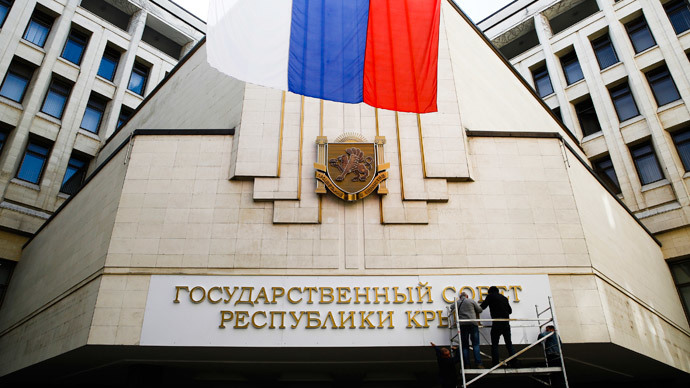‘Crimea is now part of Russia, the West has to come to terms with that’

Claiming that Crimea is part of Ukraine is the same as Serbia arguing that Kosovo is not really separated from it, Gregory Copley, editor of Defense & Foreign Affairs, told RT.
“Crimea is now part of Russia, the West will come to terms with that, the question is how much longer they’ll perpetuate the crisis in the rest of Ukraine and whether they will escalate the problem, which I think will be unwise for the US and Western European interests,” Copley said.
Lawrence Wilkerson, Colin Powell's Chief of Staff, goes further, saying that as long as Crimea belongs to Russia, Ukraine should be made a buffer zone between the West and Russia.
“This is a serious situation that will be alleviated with recognition that Russia and Crimea are going to be together, a recognition that the Ukraine should be a buffer state between let it say NATO, the West, and Russia, and a recognition on the Russian side that that’s the case and Ukraine is left alone, and the same thing on the Western side,” Wilkerson argued.
He blames the US for the creation of the artificial crisis, which resulted in downgrading relations between great world powers whereas their cooperation in other spheres is so needed.
“Obviously it’s not working the way we were trying to make it work, which is largely the US’s fault that they try to extend NATO well beyond NATO's proprietary distance, and its ability to handle an alliance that was spread all the way to Kiev, to Tbilisi. This is absurd. We started this mess, we knew (we should have known if we had a brain) that Russia would react to it, now Russia has reacted, let’s come down, let’s handle it like the great powers we’re supposed to be,” Lawrence Wilkerson told RT.
Gregory Copley also highlights another aspect of this issue, namely US financial programs aimed at boosting color revolutions. He claims that the 2004 Orange revolution was one of the examples of these programs.
“What the US and the EU have done over the past decade or more has been to fund the color revolution in Ukraine in 2004, etc., and the subsequent outbreaks recently, which have led to this present situation. And if they had the ability to act more overtly, they would have done so. They’ve instead chosen to act through street protests and indirect sociological warfare to mobilize the Western Ukrainians to seize power when they were not able to do so electorally,” he said.
Copley also added that there is “an indication that the US and the EU have had no way to go and they say they don’t wish to engage Russia militarily.”
“It’s not to say that they could prevail ultimately in a military confrontation with Russia, that’s not the point. The point is why do you want to do it over a prize which is perhaps not worth having if you are NATO or the EU or the US?” he told RT.
The statements, views and opinions expressed in this column are solely those of the author and do not necessarily represent those of RT.
The statements, views and opinions expressed in this column are solely those of the author and do not necessarily represent those of RT.












